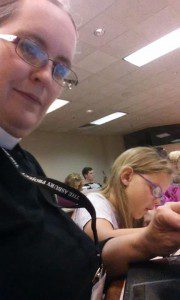This post is part of a Patheos Book club roundtable on The Vulnerable Pastor.
 I approached this book with some trepidation. I went to seminary in the mid 1990s, when the terminology that was all the rage (at least at my seminary) was that of the wounded healer. The famous book by Henri Nouwen that explained Carl Jung’s thought on this to the masses was several decades old by then (it came out in 1972) but its effects were still being felt. I have actually never read Nouwen’s book (something I need to rectify) but was well aware that he’d said that “ministers are called to recognize the sufferings of their time in their own hearts and to make that recognition the starting point of their service.”
I approached this book with some trepidation. I went to seminary in the mid 1990s, when the terminology that was all the rage (at least at my seminary) was that of the wounded healer. The famous book by Henri Nouwen that explained Carl Jung’s thought on this to the masses was several decades old by then (it came out in 1972) but its effects were still being felt. I have actually never read Nouwen’s book (something I need to rectify) but was well aware that he’d said that “ministers are called to recognize the sufferings of their time in their own hearts and to make that recognition the starting point of their service.”
What Nouwen originally meant was, I’m sure, broader, and deeper. But in my own context, and in the context of those around me, it got transformed into a message that the way to be an effective pastor was to wallow in one’s own suffering, particularly psychological suffering. Maybe even work up some interior angst if you didn’t have it already. In my first appointment out of seminary, this approach failed miserably. It failed so miserably, in fact, that I left the ministry for almost 20 years. I was afraid Mandy Smith was going to tell me the same thing.
I was wrong.
So much about this book ended up speaking to me. For sure, Smith is Australian (which I’m not) and lead pastor of a larger church than I’ll ever serve. She’s also a gifted visual artist where I struggle to draw smiley faces. But her opening story about going to a leadership conference shortly after she became lead pastor of that church and being driven to a hotel room in despair at the cheerful demeanor and slick programs of everyone she meant resonated deeply. “My collision with limited models of leadership almost took me out. Being at that…conference made me suddenly and acutely aware of how very un-male, un-businesslike, un-American and un-extroverted I am.” (Me, too, I thought. I almost said it out loud, which is really amazing for an introvert.) But both Smith and I believe that God does not only call males, Americans, business-minded folks, and extroverts into leadership So how are the rest of us that collide with one or more of those categories supposed to lead?
By being human.
It’s surprising that this was so surprising to me. And by be human Smith does not mean the spend time examining your navel lint approach I had internalized in seminary. She just means things like: Rest when you need it. Keep Sabbath. Don’t wallow in your emotions, but don’t be afraid to express them. Understand that life involves chaos and try to live with it. Say you don’t know when you don’t know. Know where your limitations are and don’t go past them. Be OK with keeping things open-ended. Don’t try to do everything yourself. (The list of “shoulds” in the middle of the book that Smith realized she was bound by is worth the price of admission. Finally–someone else willing to say in public that she feels she’s failed when she doesn’t get everything in one trip to the grocery store! And then there’s the classic “I should always get everything on my to-do list done [including everything on this list.]”)
Well, I thought, as I considered her suggestions. (Not the list of shoulds. The other list.) Maybe I can do that. Sure, some things are made more difficult by various impulses in our culture: the impulse (which Smith as an Australian used to a daily tea break finds strange) that you keep working relentlessly no matter what, and the impulse (outlined so wonderfully in a book everyone basically ought to go read right now, American Cool) to always keep our deepest feelings buttoned up and approach everything with a businesslike professionalism or a distanced sarcasm. But there is still room to start being human in the little things.

Sometimes being a vulnerable pastor–a vulnerable leader, because the application is far broader than the church–looks like putting in your away message the reason why you’re gone. Sometimes it looks like having your daughter with you while you’re live-blogging a conference because, well, that’s just how the schedule worked out today. Sometimes it looks, or would once have looked, like an inexperienced 25-year-old pastor telling her congregation, Look, I know some things. I don’t know some other things. Let’s figure them out together.
Well, the 40-year-old pastor knows some things and doesn’t know some things now. I’ve been around the block and I no longer need to try to work up the angst. It’s there sometimes. But so is vision and so is grace.
Thanks, Mandy Smith.












